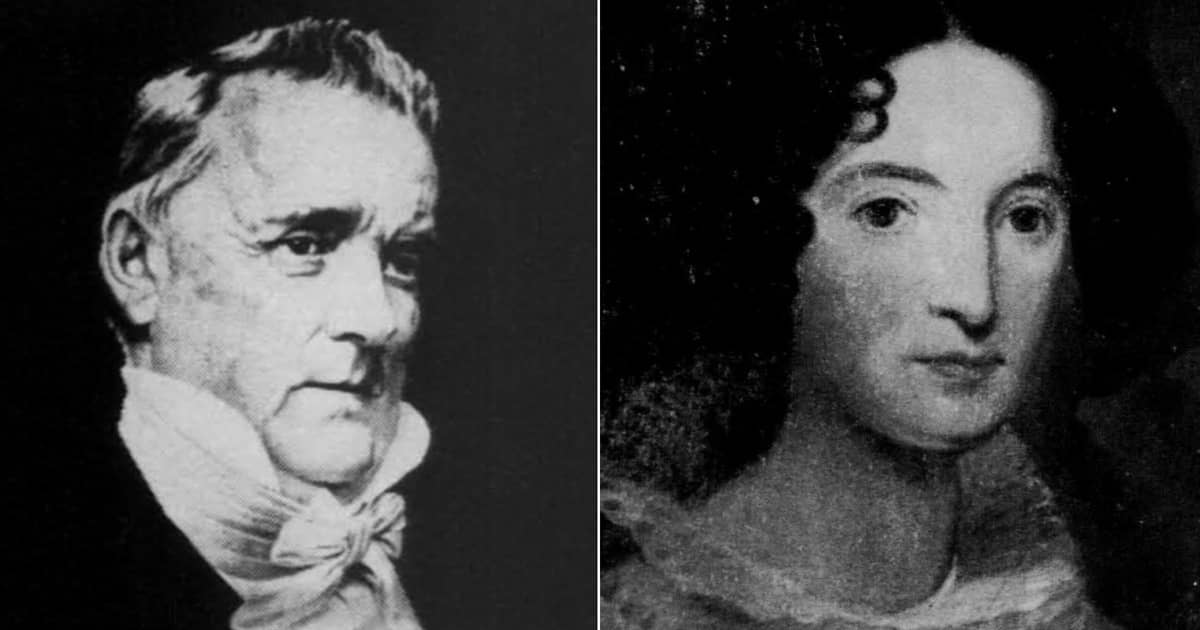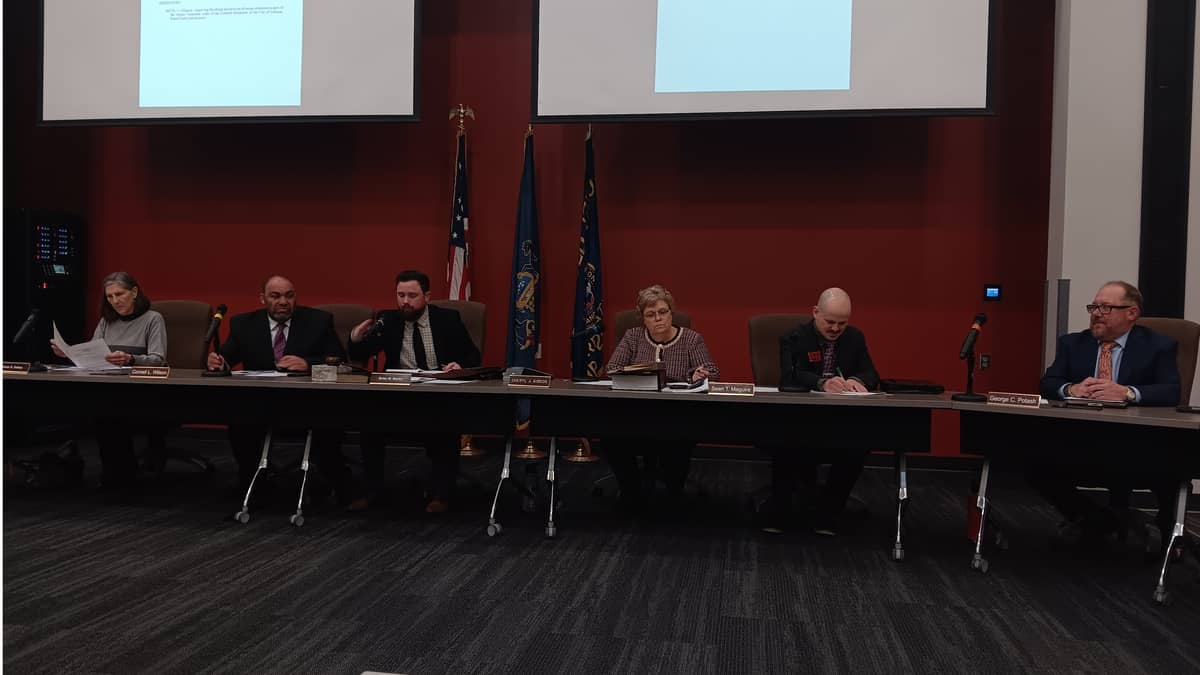This column was submitted to LebTown. Read our submission policy here.
There is seldom room for stories of love within the brutal world of politics. We seem to have a compulsion to focus only on the scandals as we feed the cynical side of our nature. But if we examine our history delicately the stories of love and devotion do exist.
Right here, in our town, there exists a love story of historic proportions. It is the tragic love story of President James Buchanan and his betrothed, Ann Caroline Coleman. This was a deeply heartbreaking story of regret and lost love that would be carried by James Buchanan until the day he dies.
Long before James Buchanan took the oath of office as our 15th President, he began his career as a young lawyer in Lancaster, the state capital at that time. James had graduated from Dickinson Law School, with honors in 1809. At the time, some who knew him were surprised that he graduated at all given the fact that he was expelled once and had a reputation as a rowdy young man that frequented taverns.
After being admitted to the Pennsylvania Bar in 1812, James struggled financially in the first year of his law practice. He considered it fortunate when he was appointed prosecutor for the newly created Lebanon County. As time passed, he proved himself to be a successful lawyer and also served two terms in the State Assembly. This handsome, blond, six footer was becoming one of the most desirable and eligible young bachelors in Lancaster.
Read More: This Presidents’ Day, remembering Lebanon’s links to our country’s highest elected office
Every day as Buchanan walked from his law office to the court house, he passed the lavish residence of ironmaster Robert Coleman, reputed to be the richest man in Pennsylvania. It was 1819 that Buchanan became smitten by Robert Coleman’s daughter, 23 year old Ann Caroline Coleman.
Ann was recognized as the outstanding catch. At first sight, this slim, dark haired beauty with dazzling eyes became the sole object of Buchanan affection. Her father, Robert Coleman, seemed to have more mansions than kings had castles and frequently Buchanan would visit Ann at their Cornwall Mansion in Lebanon County.
By 1819, Buchanan had built a solid reputation having success in both politics and law. His precise legal arguments had brought him esteem and increased his fees for services. Given Buchanan’s common and unremarkable family background, his personal success allowed him to court the daughter of Pennsylvania’s most powerful industrialist.
By the summer of 1819, James and Ann became engaged. There is every indication that Ann’s father, as a trustee of Dickinson College, was keenly aware of Buchanan’s past reputation. Adding to the fact that Buchanan came from an ordinary family, Robert Coleman had hoped for a better match for Ann within the Philadelphia aristocracy.
In the autumn of 1819, a financial panic had reached its peak and came to dominate business transactions. As a respected lawyer, James began to spend a considerable amount of time in Philadelphia. He had taken on one of the most important contemporary lawsuits that involved the continued existence of the Columbia Bridge Company in which many Lancastrians had financial interest.
Buchanan, being driven and conscientious, did not spend sufficient time on his courtship during the months of October and November. Consumed by his work, James did not pause to recognize the impact on Ann. She became distressed by the gossip that began to spread as the couple had become the main topic of local conversation within Ann’s social circle. There was a growing belief that James was not interested in winning Ann’s affection at all, it was her fathers fortune that drew him.
The tension Ann was feeling was heightened by her parents warning that James was somewhat of a philanderer. Ann’s suspicion began to take shape when James did not write her during a stay in Philadelphia on business.
Upon Buchanan’s return from Philadelphia, James stopped first at the home of his client, William Jenkins, president of the Farmers Bank. During the Panic of 1819, the solvency of his bank depended on Buchanan’s legal dealings. As it turned out, Mrs. Jenkins two nieces, the Hubley sisters, were visiting. One of the sisters, Grace Hubley, had accompanied James in the past to parties and events. Without Buchanan’s knowledge, she underhandedly rushed off a message to Ann that James had visited her first.
When Buchanan finally arrived at Ann’s home, the servant informed him that Ann did not desire to see him. Later she sent an angry letter to James terminating their engagement. The next day, at the urging of her parents, Ann set out to visit her sister, Margaret, in Philadelphia to quell her anxiety over the breakup. The new scenery did nothing to sooth her feelings of loss, on the contrary, her sorrow was overwhelming.
At that time, a woman exhibiting signs of anxiety or stress was often diagnosed by her doctor with what was known as “female hysteria.” The accepted treatment for female hysteria was Laudanum, a medication that contained approximately 10% opium by weight. Ann took such a dose on the night of December 9, 1819, the night she died.
There is no way to determine if the lethal dose of Laudanum was an act of suicide or simply a mistake in dosage. But there were those that settled on the theory that Ann died of a deliberate overdose. We will never know for sure. But we do know who was blamed and that was her fiancée James Buchanan.
When James received the news of Ann’s death he was overcome with grief. He immediately wrote an emotional note to Mr. Coleman pleading to see Ann’s body and walk with her one more time in the funeral procession.
In his note he also expressed the fact that she, as well as himself, had been the victims of much abuse. With great conviction, James also stated to Ann’s father, “happiness has fled from me forever.” Despite this emotional plea, Ann’s father refused his request and Ann was buried at St James Episcopal Church on North Duke Street in Lancaster, Pennsylvania.
Quote whenever James Buchanan was asked why he did not marry: “Marry I will not, for my affections were buried in the grave.”
James Buchanan lingered in the horrible tragedy of Ann’s death as rumors spread around him that he was not only responsible for Ann’s death, but her murderer. James friends, realizing the unbearable accusations James was facing decided that it was best to get him out of town. They then nominated him for Congress and, beginning in 1821, his political career blossomed. Buchanan’s career would keep him in Washington for the next 40 years, ending with his term as President.
While in Washington, Buchanan had many suitors, but he never married. He was content to be the Bachelor Father to his nieces and nephews that were orphaned by the death of their parents. He raised them, paid for their education, and ensured their financial security.
After serving his tumultuous term as President, he retired to his Wheatland home in Lancaster where he spent the remainder of his life. In May of 1868, he became gravely ill and at the age of 77 died of respiratory failure.
There is much mystery and uncertainty regarding many aspects of the life of James Buchanan and we will probably never know what was in his heart. But there was one final act that sheds light on his tragic life. Upon his death he directed that his nieces and nephews retrieve a packet of letters that he had lovingly tied with a pink ribbon. These were the love letters from Ann, his one and only love, and he kept her letters all his life as his only precious memory. On the ribbon, in his own handwriting, was a message that upon his death the letters should be burned without anyone reading them. His last request was honored and the letters were burned.
Sometimes, the last thing we choose to do in life tells the real truth of our existence, what was truly important to us, and what we want to be remembered for. In the case of James Buchanan, in the end, the only message he left behind for all eternity was… I love you Ann and I stayed faithful to the end.
Robert Griffiths is a former educator and a current educational consultant and Cornwall-Lebanon School District board member. He lives in South Lebanon.
Want to submit your own column?
Learn more here.

























